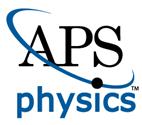American Physical Society Appoints Rachel Burley Chief Publications Officer
American Physical Society (APS)The American Physical Society (APS), publisher of the prestigious Physical Review journals, has appointed Rachel Burley as its first Chief Publications Officer (CPO). In this new role, Burley will manage more than a dozen leading peer-reviewed journals.

